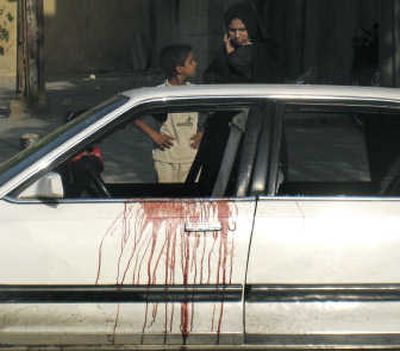Widow among guard victims

BAGHDAD – The woman had turned her car into a taxi service for government employees to make money to raise her three daughters after her husband died during heart surgery.
Traveling the streets of Baghdad is a risky business, fraught with dangers of random car bombings and drive-by shootings, and many Iraqis are willing to pay for a safe ride.
But Marou Awanis, a Christian, did not lose her life at the hands of insurgents. She and another Christian woman in the passenger’s seat were gunned down by guards from a foreign security company at an intersection in an affluent neighborhood of the capital, Iraqi officials said.
It was the latest seemingly unprovoked attack on civilians to draw intense scrutiny to the heavily armed and some say trigger-happy teams of foreign private security firms. And it came in the midst of a firestorm over Blackwater USA guards who allegedly opened fire without provocation in Baghdad three weeks ago and killed 17 people.
“Today’s incident is part of a series of reckless actions by some security companies,” Iraqi government spokesman Ali al-Dabbagh said.
The shootings came one day after the Iraqi government handed U.S. officials the report from an Iraqi investigation of the Blackwater incident ordered by Prime Minister Nouri al-Maliki. It called for the company to pay $8 million in compensation to the families of each victim. The commission also said Blackwater guards had killed 21 other Iraqis since it began protecting American diplomats in Iraq shortly after the U.S.-led invasion 4 1/2 years ago.
In the latest case, Interior Ministry spokesman Abdul-Karim Khalaf said the Dubai-based Unity Resources Group guards shot the women and the company apologized to the Iraqi government. The shooting occurred near Unity offices in central Baghdad’s Karradah district.
The deaths Tuesday may sharpen demands to curb the expanding array of security firms in Iraq watching over diplomats, aid groups and others.
“We deeply regret this incident,” said a statement from Michael Priddin, the chief operating officer of Unity Resources Group, a company owned by Australian partners but with headquarters in Dubai.
Initial accounts – from company statements, witnesses and others – suggested the guards opened fire as the car failed to heed warnings to stop and drifted closer to the convoy. They killed the two women before speeding away.
It was not immediately clear whether the guards were protecting a client at the time, but a group that uses its security agents said its personnel were not at the scene.
Four armored SUVs – three white and one gray – were about 100 yards from a main intersection in the Shiite-controlled district. As the car, a white Oldsmobile, moved into the crossroads, the Unity guards threw a smoke bomb in an apparent bid to warn the car not to come closer, said Riyadh Majid, an Iraqi policeman who saw the shooting.
Two of the Unity guards then opened fire. The woman driving the car tried to stop but was killed along with her passenger. Two of three people in the back seat were wounded.
Priddin’s statement offers a similar account: “The first information that we have is that our security team was approached at speed by a vehicle which failed to stop despite an escalation of warnings which included hand signals and a signal flare. Finally shots were fired at the vehicle and it stopped.”
Iraqi police investigators said they collected 19 spent 5.56 mm shell casings, ammunition commonly use by U.S. and NATO forces and most Western security organizations. The pavement was stained with blood and covered with shattered glass from the car windows.
Majid said the convoy raced away after the shooting. Iraqi police came to collect the bodies and tow the car to the local station.
A second policeman, who spoke on condition of anonymity because he feared retribution, said the guards were masked and wearing khaki uniforms. He said one of them left the vehicle and started to shoot at the car while another opened fire from the open back door of a separate SUV.
The victims were identified by relatives and police as Marou Awanis, born in 1959, and Geneva Jalal, born in 1977. Awanis’ sister-in-law, Anahet Bougous, said the woman had been using her car to drive government employees to work to support her daughters after her husband’s death.
“May God take revenge on those killers,” Bougous said, crying outside the police station. “Now who is going to raise them?”
“These are innocent people killed by people who have no heart or consciousness. The Iraqi people have no value to them,” said a man who was among relatives gathered with a Christian priest at the local police station.
Iraqi anger has grown against the private security companies – nearly all based in the United States, Britian and other Western countries – as symbols of the lawlessness that has ravaged their country for more than four years.
Unity provides armed guards and security training throughout Iraq. Its heavily armed teams are Special Forces veterans from Australia, the United States, New Zealand and Britain – as well as former law enforcement officers from those countries.
In other violence across Iraq, at least 57 Iraqis were found dead or killed in bombings and shootings.
In Beiji, an oil hub 155 miles north of Baghdad, two suicide bombers drove a minibus laden with explosives into the house of a local police chief and detonated an explosives-packed Toyota Land Cruiser outside the home of a leading member of the local Awakening Council, a group of Iraqis who have turned against al-Qaida in Iraq extremists.
Police in Beiji said at least 19 died in the attacks.